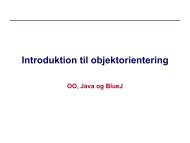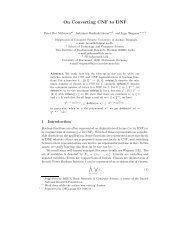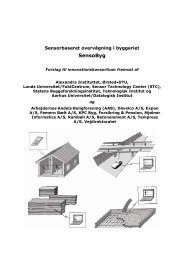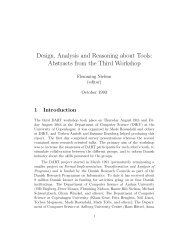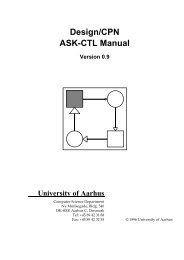towards a provotyping approach in systems development
towards a provotyping approach in systems development
towards a provotyping approach in systems development
Create successful ePaper yourself
Turn your PDF publications into a flip-book with our unique Google optimized e-Paper software.
practice to breakdowns through role-play<strong>in</strong>g is a k<strong>in</strong>d of provocation. Moreover,<br />
organizational games br<strong>in</strong>g the collective aspect more <strong>in</strong>to focus. The<br />
focus, however, <strong>in</strong> this <strong>approach</strong> is on commitments and negotiation of conditions,<br />
i.e. ‘construction’ of the future.<br />
The idea of an organizational game focus<strong>in</strong>g on concrete experience and<br />
provocation of the collective practice seems useful <strong>in</strong> relation to the notion of<br />
provocation through concrete experience. However, it must be modified to<br />
shift the focus from commitments to the future <strong>towards</strong> provocation of the<br />
present.<br />
5 Towards a Provotyp<strong>in</strong>g Approach<br />
This paper took the follow<strong>in</strong>g question as its po<strong>in</strong>t of departure: How do<br />
we on the one hand, devise qualitatively new <strong>systems</strong>, and on the other<br />
hand, ensure their usability <strong>in</strong> the given practice? In particular, the question<br />
focused on the area between <strong>in</strong>itial <strong>in</strong>vestigation/analysis and design. Inspiration<br />
arose from two sources: prototyp<strong>in</strong>g, address<strong>in</strong>g the question of how<br />
to design for usability, and activity theory, address<strong>in</strong>g the question of how to<br />
create the qualitatively new and found it <strong>in</strong> current practice. The result was<br />
the idea of comb<strong>in</strong><strong>in</strong>g provocation and concrete experience. The idea was<br />
elaborated by address<strong>in</strong>g the questions of why, what, and who, lead<strong>in</strong>g to<br />
a notion of the <strong>systems</strong> developer as provocateur provok<strong>in</strong>g discrepancies <strong>in</strong><br />
the concrete, everyday practice to call forth what is usually taken for granted.<br />
This notion provides a new perspective on discrepancies and mutual understand<strong>in</strong>g.<br />
Discrepancies were taken as the po<strong>in</strong>t of departure, and thus seen<br />
more as a resource than as problematic or irrelevant. Initial lack of mutual<br />
understand<strong>in</strong>g was found to be not just a problem, but also a resource<br />
<strong>in</strong> avoid<strong>in</strong>g bl<strong>in</strong>dness. Subsequently, through a comparison to related <strong>approach</strong>es,<br />
the ideas were contextualized and techniques for carry<strong>in</strong>g them<br />
out outl<strong>in</strong>ed.<br />
The basic idea was to get participants to experience current practice <strong>in</strong><br />
new ways by do<strong>in</strong>g it <strong>in</strong> alternative ways. From the above comparison at least<br />
three different ways to accomplish this can be seen. One is to use alternative<br />
artifacts such as on-the-shelf ware, prototypes, and mock-ups as vehicles for<br />
provocation—provotypes. The <strong>in</strong>tention is to use them as concrete media for<br />
call<strong>in</strong>g forth experiences <strong>in</strong> current practice, <strong>in</strong>stead of focus<strong>in</strong>g on how they,<br />
22



